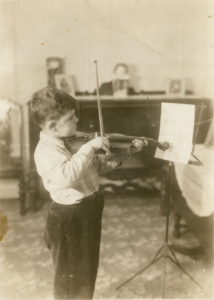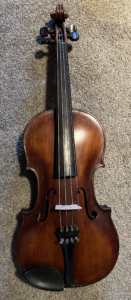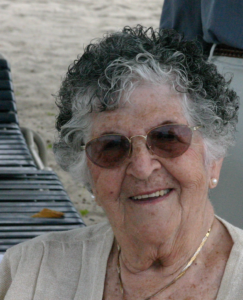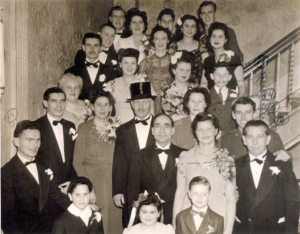In 1994, as I was approaching my 55th birthday, I realized one of my (many) regrets in life was that I never learned to play the violin, an instrument whose music I very much love. I own a violin – it was my mother’s when she was young – and it has haunted me for many years, singing out, in my imagination, to be played.
A half-century before that, when I was about five, I did take a few violin lessons with a child-size violin, which I also  still have, but, I refused to continue. Mr. Latanche, the violin teacher to whom my mother sent me was her teacher when she was a child but, for me, he was too demanding, too harsh, and too difficult to understand. I grew up in a blue-collar neighborhood of immigrants with many languages and his voice was strongly flavored with the melodic tones of wherever it was he grew up and I couldn’t, or didn’t want to, understand him. Years later I realized the bigger factor discouraging me from taking violin lessons may have been the jeering I received from other children as I walked by carrying my little violin case. In any event, despite being a mostly obedient son who didn’t even rebel very much in adolescence, I refused to study the violin.
still have, but, I refused to continue. Mr. Latanche, the violin teacher to whom my mother sent me was her teacher when she was a child but, for me, he was too demanding, too harsh, and too difficult to understand. I grew up in a blue-collar neighborhood of immigrants with many languages and his voice was strongly flavored with the melodic tones of wherever it was he grew up and I couldn’t, or didn’t want to, understand him. Years later I realized the bigger factor discouraging me from taking violin lessons may have been the jeering I received from other children as I walked by carrying my little violin case. In any event, despite being a mostly obedient son who didn’t even rebel very much in adolescence, I refused to study the violin.
Back to 1994. With great enthusiasm and anticipation of being able to produce the glorious sounds of Bach and Mozart, I walked to the office of a colleague, Karen Scharre. Karen is an outstanding pathologist and also a violinist in the Doctors Orchestra of Los Angeles. I told her of my intention and asked if she could recommend a teacher who could work with an older student. Karen is as exact in life as she is in her work; she does not mince words.
“You’re too old,” was her disturbingly frank response (Karen’s memory of this is a little different than mine, but not significantly; her’s is probably more accurate, but I will use mine).
“What do you mean?” I blurted out, too shocked to be hurt.
“Exactly what I said. You’re too old to learn to play the violin.” She then modified her response to say that I could learn to play to a degree, with time and effort, but not well.
It is hard to describe my feeling at that moment. Imagine, if you will, Icarus when he realized he was too close to the sun: I was very unhappy.
Some other colleagues in the hospital also played the violin. One of them, the late, great surgeon Leon Morgenstern, happened to be coming to our home for dinner the following week. I believed Karen, but I would get a second opinion.
“I’m afraid you’re too old,” Leon said as he turned my violin, once my mother’s violin, in his hands. “You can learn enough to play rudimentary things but I suspect you wouldn’t be happy with that.” I agreed; “Three Blind Mice” did not seem sufficient reward for what I knew would be many hours invested in studying and practicing. Another journey toward the sun ended up in a second tumble into the sea.
once my mother’s violin, in his hands. “You can learn enough to play rudimentary things but I suspect you wouldn’t be happy with that.” I agreed; “Three Blind Mice” did not seem sufficient reward for what I knew would be many hours invested in studying and practicing. Another journey toward the sun ended up in a second tumble into the sea.
For better and for worse, I am a Taurus and was not quite ready to surrender my dream.
Months later I was in Chicago for the annual “liver meeting.” At a dinner of liver pathologists we were celebrating the birthday of the now-deceased Peter Scheuer, the brilliant and beloved leader of our profession from London who I knew well. As a part of the celebration, Jay Lefkowitch, another renowned liver pathologist and a wonderfully gifted artist and musician, invited players from the world-renowned Chicago Symphony Orchestra (CSO) to play his own arrangement for string quartet of “Happy Birthday.” At dinner I was fortunate enough to be seated next to one of the CSO violinists. With considerable hesitancy, I told him about my intentions and the judgements of my two physician colleagues. He, without any hesitancy, responded, “They’re right. You’re too old. You should have started when you were five or six.”
But this Taurus still wouldn’t accept the verdict of the toreador.
I took the violin to a violin repair shop and had it cleaned and restrung. I started taking lessons with an earnest and encouraging young man. I learned how to properly hold the violin and the bow. I learned how to tune the violin. I started practicing the aforementioned “Three Blind Mice.”
After the third lesson, and daily practicing, I accepted reality: I would never play the violin well.
Even this Taurus knew it was time to stop.
Recently, as I was carrying out some long overdue cleaning of my office storage closet, these memories came rushing back as I held my mother’s violin.
The violin is modelled after the ones created by the 17th century Austrian and Germanic luthier (maker of stringed instruments), Jacob Stainer (1619-1683). His violins were the most sought after throughout Europe until the 18th century, when music tastes changed. Bach and Mozart, among many other famous musicians, favored Stainer’s violins. The Stainer violin has a sweet and gentle sound but is less forceful than that of the violin created by his contemporary, the Italian Antonio Stradivari (1644-1737) and, consequently, less sought after by those who play in modern, large concert halls. Original Stainer violins, as well as his other string instruments, are rare and greatly valued by those who appreciate early music on period instruments.
And, of course, as I hold the violin I think about my mother who died in 2009 at the age of 93. She was the last of her generation of family members
My mother, Alice Podberesky Geller, lived a long, productive and giving life. She laughed easily, appreciated music, loved to read and loved movies. Once, near the time of her 90th birthday, I took her to a big-screen showing of her favorite film, “Gone With the Wind,” a film she had seen many times, and she loved seeing it again. She never said a cruel word about anyone and gave love freely and unconditionally. She loved to travel and, if she ever learned your birthday, you could rely on getting a birthday card from her every year until the day she died.
to read and loved movies. Once, near the time of her 90th birthday, I took her to a big-screen showing of her favorite film, “Gone With the Wind,” a film she had seen many times, and she loved seeing it again. She never said a cruel word about anyone and gave love freely and unconditionally. She loved to travel and, if she ever learned your birthday, you could rely on getting a birthday card from her every year until the day she died.
Her father, Louis Podberesky, was born in 1883 in Vilna gobergna (suburb of Vilna), in what was then Russia but is now Lithuania. Louis was a graduate of the renowned University of Vilna. Soon after being drafted into the Russian cavalry he deserted and came to America. Louis loved to read. He also loved music, almost never missing the Saturday broadcasts of the Metropolitan Opera. Alice always said the Podbers, as they came to be known, were a happy family who knew how to enjoy life.
Alice’s mother, Fanya (Fannie) Levine, also came from Vilna gobergna, but she was poor. She travelled from Vilna gobergna to the United States by herself when she was 15. She didn’t meet Louis until they were both in Brooklyn.
Louis and Fannie met and married in 1908 in New York City. They had a series of small, stores (Louis didn’t have a sense for business) including a shoe store and two “candy” stores (newspapers, cigarettes, ice cream, sodas, magazines, comic books and toys, as well as candy). As a child I spent many hours at the last one, at 324 Church Avenue in Brooklyn. In addition to Alice there was Hy, an older brother and Leo, a younger; they lived at 88 16th Street in Brooklyn, where Alice still lived when both my younger brother and I were born.
In 1938, still in the time of the Great Depression, Alice married Sam Geller, who was the seventh of eight children of Hyman and Celia Geller. Alice loved the Geller family at least as much as the Podbers and the Levines. She revered Hyman, her father-in-law, and delighted in the regular Sunday family gatherings at 41 Louisa Street, Brooklyn. Sam was a free spirit who believed in, but never quite found, that pot of gold at the end of the rainbow. Although they divorced many years ago, she never stopped caring for and worrying about Sam. She was fortunate to meet and fall in love with Anthony Cozza who, in turn, loved her very deeply. They had a wonderful life together and she also embraced the Cozza family as they embraced her.
Alice cared deeply for everyone she knew, more for her children and their children but also for everyone else. Most of all she believed in family. Her walls were covered with photographs of loved ones – Podbers, Gellers, Levines, Cozzas – children, grandchildren, great granddaughter, cousins, nieces and nephews and their families – covering almost floor to ceiling with little of the wall showing through. She always had supplies of cards for birthdays and holidays and many looked forward to her yearly greetings. She never appreciated how much she was loved in return.
She wanted little for herself but gave to any charity that sent her a request, whether it be a native American school in Arizona, a missionary in Africa, the cancer society, the heart association, UNICEF, Project Hope, a Jewish organization, a Christian organization – only the need mattered to her.
Although her own mother was sometimes quite harsh with her, she greatly admired Fannie’s high intelligence and strength, often telling the story of how Fannie managed to personally meet with the publisher of the New York Daily News in order to protect their little candy store from new competition. But my mother rarely told how she herself  managed to talk to Fiorello LaGuardia, Mayor of New York, and got a one-night reprieve from the World War II blackout requirements for the 50th wedding anniversary celebration of her father- and mother-in-law, my paternal grandparents (in the photograph, my parents are up at the upper left and I’m at the bottom front left).
managed to talk to Fiorello LaGuardia, Mayor of New York, and got a one-night reprieve from the World War II blackout requirements for the 50th wedding anniversary celebration of her father- and mother-in-law, my paternal grandparents (in the photograph, my parents are up at the upper left and I’m at the bottom front left).
Her mantra for her children was “education, education, education.” She graduated from high school in 1930, before she was 16 years old but, because of limited monies at the start of the Great Depression, could only go to Brooklyn College, with its minimal tuition fee, at night while she worked during the day. She always regretted not completing her degree. She always wanted to be a teacher. Instead, she worked in a variety of jobs including directing the transportation office for the Army at the Brooklyn Army Terminal where she won award after award for her performance.
If your children are the measure of your success, she succeeded. Stephen became a successful pathologist and have held professorships at three medical schools, have given lectures around the world and earned numerous awards for my teaching. Dennis, eight years younger, earned a Ph.D. in mathematics, is an expert in computer sciences and was both a National Science Foundation Fellow and a Woodrow Wilson Fellow. He taught in colleges and, most recently, secondary schools, where he has also been a teacher of teachers. We have both authored articles, chapters and books.
But neither of us counts our careers as her greatest gift; she gave us thoughtfulness, sensitivity, a sense of tolerance, a belief in fair play, a commitment to honesty and honor, an understanding that people are more important than things, a love for reading and of music and, most of all, she gave us her unquenchable love.
She made her own way in life. Her great fear was in being a burden to those she loved – and she never was. She was not religious, as her mother was not, but she was fiercely and proudly Jewish.
She would often recite, with the fervor of an Olivier, a soliloquy from Macbeth (“To-morrow, and to-morrow and to-morrow …”) that she had learned in childhood. She clung to this to convince herself that her memory was intact and she repeated it until her last days when much of her memory was gone. She would often copy, in her own hand, poems or other things she read that she wanted to keep and recall. Among her papers was this poem by Emily Dickinson, but in her handwriting, which summarizes at least a part of her life of giving and caring:
If I can stop one heart from breaking
I shall not live in vain:
If I can ease one life the aching,
Or cool one pain,
Or help one fainting robin
Unto his nest again,
I shall not live in vain.
For many years, she volunteered at Maimonides Hospital in Brooklyn. When she retired and moved to Florida, she volunteered at a hospital but also at a junior high school where she helped young people improve their reading skills. When she was well into her 80s, and living in Westwood, Los Angeles, she volunteered at the UCLA hospital.
Her life was a great and glorious gift to us. How fortunate we were to have had her for so long.
What should I do with her violin?
Should I try to sell it? I don’t think so. I will donate it to a school so a young person can learn to play.
April 22, 2022 at 8:31 pm
Stephen, very nice (and interesting) history. I tried to learn to play piano starting in my late 40s. I come from a family where both my parents were musical and my father was exceptionally gifted. I worked hard at it and eventually I bought a grand piano which I loved to play. The problem is that musicians are born, it is just not something that can be learned. My father – without ever having a single lession – could do amazing things with music. It just was a gift. Like a perfect memory or exceptional math abilities. I certainly never had it and eventually carpal tunnel and a wife who did not like her husband practicing 3 hrs a night put an end to my adventure. But still, it was a wonderful adventure and only made me admire more those lucky few with the gift. You are old enough to have heard J. Heifetz on the radio or on a record. Pure genius. No other word. A gift of God (so to speak).
April 22, 2022 at 9:13 pm
I am grateful that I started learning piano at age 8 or 9, continuing till my mid-teens. It was thus possible for me to resume after a brief 45-year hiatus and continue playing right up until today at age 82. (You do the math.)
April 22, 2022 at 10:00 pm
Thank you for sharing your family and especially mother with us, Steve. I have admired you for half a century without knowing most of this but am most grateful to learn it now
Milt
April 23, 2022 at 1:25 am
Dear Stephen, what a wonderfully written story about your mother and about your passion for learning the violin. Thank you for sharing it with us. Maybe you know that a Greek pathologist, George Kontogiorgos, Past President of IAP who is also a renowned music composer, has written a music piece called “ My mother’s violin”? It seems to me that your stories, in life and fiction, run in parallel. I am deeply moved by this…. Could this music https://youtu.be/kHDJKoNktKs
be the soundtrack of your mother’s violin story? With warmest wishes from Greece, Dina
April 23, 2022 at 1:28 am
Dear Prof. Geller,
Your violin story makes me feel as if we had been twin historical brothers to Jewish mothers who had a goal for their children in the field of classic education, a goal which had a partial success when it came to music.
My parents never sat in a café, never took vacations in hotels. Every penny they had earned was spent on our education, which included, how would it be possible differently, education for music.
After school hours (Private, the public was not good enough, they insisted, and paid) I had to walk my way three times a week to the music conservatory for piano lessons.
If that was not enough I had to walk my way to the “Centre de Culture Française” for French lessons, to the academy of fine arts to take art lessons… “deprived” childhood.
I rebelled.
I had to practice the piano at least an hour a day. I concluded with my mother that if I had to go to the bathroom while practicing, it would be included in practice time, not deducted. I had a book hidden in the bathroom.
My progress was not impressive, to say the least. In students concerts my teacher encouraged me to keep on playing, in spite of mistakes. “The parents would not feel, unless you stop. Keep on playing”.
Instead of spending their basic income (Israel was flooded with academics, war survivors, who worked for a basic income) on little pleasures, they spent it on monthly payments for a piano which was, probably, the most valuable asset they had ever purchased.
As my mother was noticing that I needed “some” encouragement, they bought a simple record player and 78 RPM second hand records of classical music, hoping it would be a stimulant for an extra effort.
I demanded to adopt a dog as a precondition to go on for another year. That childhood dog (and others who followed, in time) shaped my sensitivity, probably, for life time.
But the piano… I stopped.
55 years had gone by.
55 years of not touching a piano.
I bought one, bought notes, and went back to play.
Your colleagues who told you you were too old to play were right. I play badly. I go over and over difficult passages. I get it “smooth”. The next day it requires a re-practice.
Ah… one important detail…
The piano I bought is a Yamaha electric one. It can be played with earphones, so no one in the neighborhood would be offended by the terrible pianist who dares “contaminating” the air with such a poor playing.
Thank you for bringing up these memories.
April 23, 2022 at 7:36 am
Good to hear from you again and enjoyed your latest heartfelt essay. Family memories are always wonderful and you express them so well.
As to musIcal instrument ability, I can relate to your regret. Neither I nor my children ever learned to play a musical instrument But in compensation my three grandchildren, now in high school or about to start college, have been trained, are musical, and in fact perform as a band, a source of great pleasure for me!
Joel
April 23, 2022 at 11:55 am
A wonderful story………Thank you
April 23, 2022 at 11:58 am
Stephen, thanks for sharing this story. Wonderful memories of Brooklyn family life with so many parallels. I started violin lessons when i was about 7, and even performed at an assembly at PS92 maybe in 4th grade. But I knew at that age that this wasn’t my thing so i stopped a few years later. Later, in my 40’s and in my hippie stage, I grew a beard and took up the guitar. Our family enjoyed singing along during our summer camping trips in Maine. Like you, I tried to resume the guitar as a Covid-related activity two years ago. I retrieved the dusty case from my son, cleaned and restrung it, bought a set of picks on Ebay, and found my notebook full of folk songs, but my bent and somewhat arthritic fingers let me down.
April 23, 2022 at 1:31 pm
Dr Geller
What a beautiful story, a tribute to your mother that the violin ripped from your memory. Thank you for letting us know a little about your family history.
I am always pleased to be gifted with these “tales”.
Fernando Campos
May 5, 2022 at 9:32 pm
Dr. Geller, thank you for sharing the amazing story about your mom’s violin. Always a pleasure to read your essays.